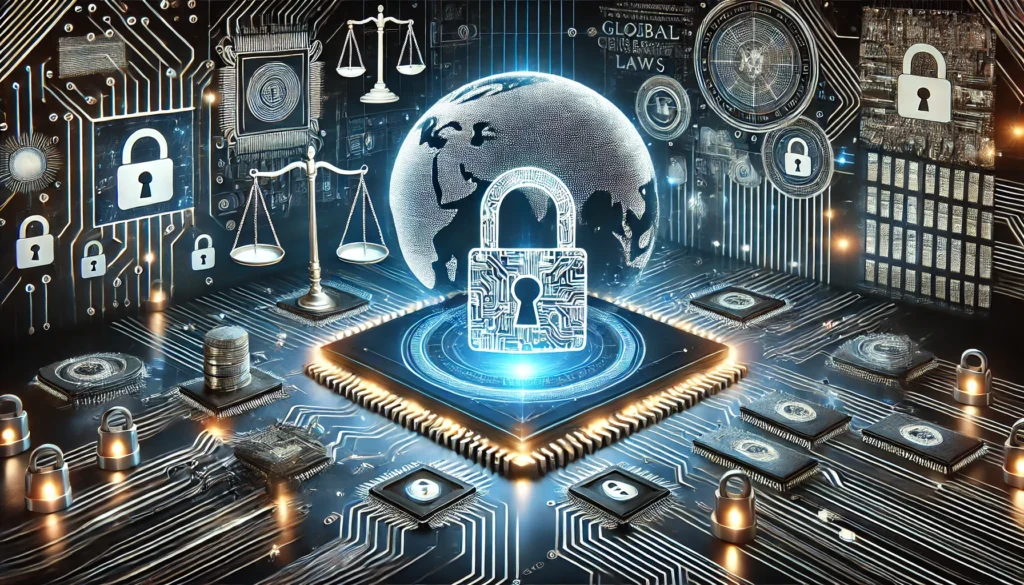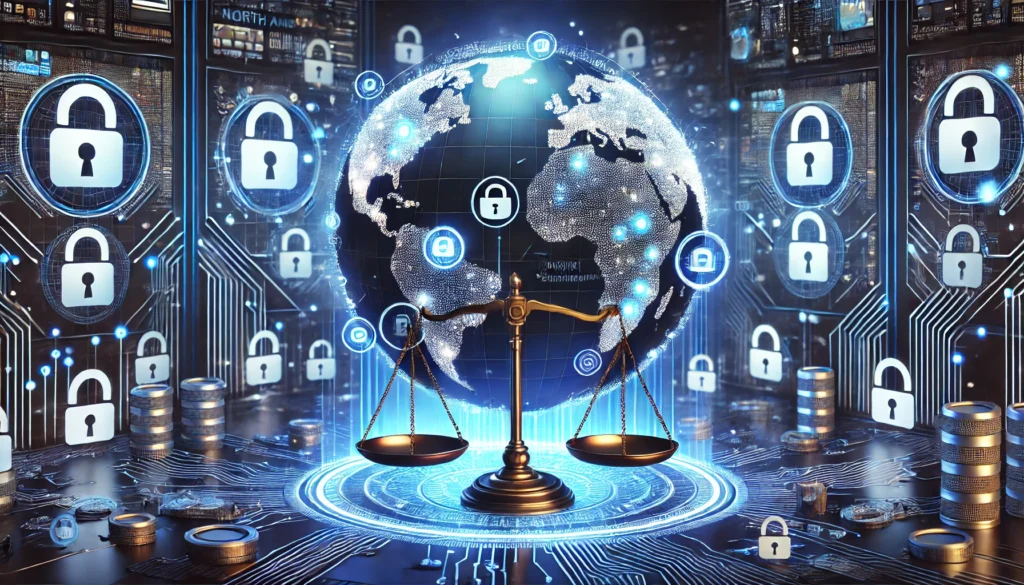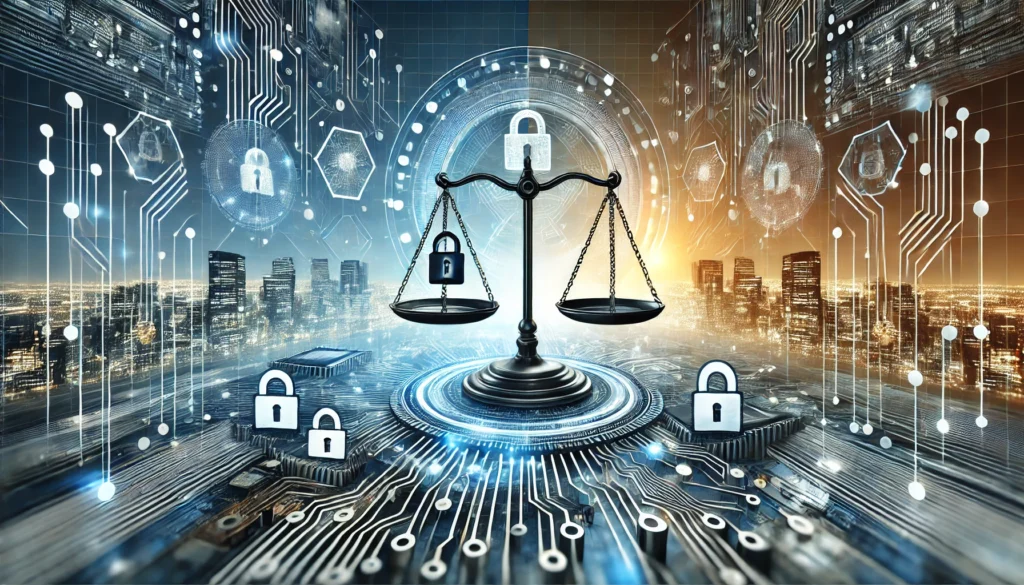In this article, we will explore Cybersecurity Laws Evolving: Key Opportunities and Looming Challenges. In today’s progressed world, around each perspective of our lives—work, communication, support, and in fact health—is related to the web. With this creating reliance on development comes the extended danger of cyberattacks. Cybersecurity is more imperative than ever, and governments around the world are determinedly working to make and move forward laws and controls to secure individuals, businesses, and governments from cyber threats. In this article, we will examine how cybersecurity laws and bearings are progressing to address these creating challenges.
What Are Cybersecurity Laws and Regulations?
Cybersecurity laws and controls are legal frameworks that manage how organizations and individuals must secure their progressed systems, data, and frameworks. These laws are sketched out to ensure the mystery, perception, and openness of information, expect data breaches, and construct up rules for how organizations should to respond to cyber occurrences.
Cybersecurity laws can shift broadly between nations and locales, and they proceed to advance as innovation propels and unused dangers rise. These laws frequently cover regions such as information security, encryption measures, occurrence detailing, and the obligations of organizations to secure delicate information.
Why Are Cybersecurity Laws Getting to be More Important?

There are a few key reasons why cybersecurity laws and controls have gotten to be so crucial:
1. Expanding Recurrence of Cyberattacks
Cyberattacks have gotten to be more visit, modern, and harming over the past decade. High-profile episodes, such as the Want to Cry ransomware assault, information breaches at major enterprises, and cyber-espionage campaigns, have highlighted the vulnerabilities of both private and open segment organizations. As cybercriminals create modern methods and devices, it gets to be indeed more basic to have a lawful system in put to combat these threats.
2. Developing Sum of Delicate Information Online
Every day, millions of individuals share individual, money related, and health-related data online. This information is put away in databases, exchanged between systems, and utilized by businesses to progress administrations. With the expanded sum of delicate information being produced, there is a requirement for more grounded securities to avoid unauthorized get to and misuse.
3. Fast Innovative Advancements
Technologies like cloud computing, manufactured insights, the Web of Things (IoT), and blockchain are revolutionizing businesses. Whereas these innovations offer noteworthy benefits, they moreover present unused security dangers. Officials must adjust their controls to address the vulnerabilities made by rising advances and guarantee that security measures advance to keep pace.
4. Globalization of Cyber Threats
Cyber dangers are not constrained to national borders. Programmers can assault organizations anyplace in the world, regularly from a distinctive nation. This worldwide nature of cybercrime implies that nations require to participate on cybersecurity laws and systems to avoid, moderate, and react to cyber dangers effectively.
Key Regions of Advancing Cybersecurity Laws and Regulations

As cyber dangers proceed to advance, cybersecurity laws and controls are adjusting to meet the challenges of the advanced scene. Underneath are a few of the key ranges where cybersecurity controls are changing.
1. Information Protection and Protection
Data security is one of the most critical ranges of cybersecurity direction. With developing concerns around how organizations handle individual information, numerous nations have presented stricter laws to guarantee that individuals’ data is protected.
- General Information Assurance Control (GDPR): The GDPR, which came into impact in 2018, is one of the most powerful information assurance directions all-inclusive. It applies to any organization that forms the individual information of European Union (EU) citizens, notwithstanding of where the organization is based. The GDPR forces strict prerequisites on how companies collect, store, and oversee individual information, with overwhelming punishments for non-compliance.
- California Customer Security Act (CCPA): In the Joined together States, the CCPA is another key control that centers on information protection. It gives California inhabitants the right to know what individual information companies collect, to ask the cancellation of their information, and to pick out of information sharing for showcasing purposes.
As more nations and districts receive comparative controls, we are seeing a worldwide slant toward reinforcing information security and security laws. Organizations are presently required to actualize more grounded security measures, conduct customary reviews, and react to information breaches promptly.
2. Occurrence Detailing and Disclosure
When a cyberattack happens, organizations must rapidly recognize, contain, and react to the risk. Be that as it may, the speed and straightforwardness with which companies uncover these episodes is a region of developing center for lawmakers.
- Breach Notice Laws: Numerous nations, counting the Joined together States, have laws that require organizations to inform people when their individual information has been compromised in a breach. These directions are planned to donate people the opportunity to ensure themselves from potential hurt, such as personality theft.
- Cybersecurity Occurrence Announcing: In a few wards, there are presently prerequisites for companies to report certain sorts of cyber episodes to government specialists. For illustration, the Joined together States as of late presented the Cyber Occurrence Detailing for Basic Framework Act (CIRCIA), which orders that basic framework divisions report noteworthy cyber occurrences to the Cybersecurity and Foundation Security Organization (CISA).
These controls are advancing to energize quicker and more straightforward detailing, which is significant for relieving the effect of cyberattacks and empowering facilitated responses.
3. Basic Framework Protection
Critical framework alludes to the frameworks and resources basic to the working of society—such as vitality frameworks, water supply frameworks, and transportation systems. Securing these imperative frameworks is a beat need for governments around the world, and cybersecurity controls are being overhauled to reflect this.
- Cybersecurity Systems for Basic Foundation: In the Joined together States, the National Established of Guidelines and Innovation (NIST) has created a cybersecurity system that diagrams best hones for securing basic foundation. Other nations, counting the EU and the UK, have comparative frameworks.
- Regulatory Commands for Basic Foundation: In expansion to systems, numerous nations are sanctioning laws that force particular cybersecurity commitments on administrators of basic foundation. These controls may require organizations to conduct normal security appraisals, execute solid get to controls, and report episodes to government agencies.
As the chance of cyberattacks focusing on basic foundation increments, governments are presenting stricter controls to guarantee these frameworks are enough protected.
4. Cybersecurity Measures and Compliance
To deliver course on actualizing fruitful cybersecurity measures, governments and organizations have made an expand of cybersecurity benchmarks and compliance frameworks.
- ISO/IEC 27001: The Worldwide Organization for Standardization (ISO) has made a set of rules (ISO/IEC 27001) for setting up, keeping up, and progressing a data security administration framework (ISMS). Companies that take after these rules appear they are committed to ensuring delicate data.
- Compliance with Industry-Specific Controls: Certain businesses, such as healthcare, back, and defense, have extra cybersecurity controls due to the delicate nature of the data they handle. For layout, the Success Securities Transportability and Commitment Act (HIPAA) in the Joined together States commands particular cybersecurity hones to ensure calm thriving data.
These rules are continually changing to bargain with unused dangers and make beyond any doubt organizations are remaining up-to-date with the most recent cybersecurity hones.
5. Cybersecurity in the Supply Chain
Cybersecurity directions are moreover growing to cover the security of third-party merchants and temporary workers that an organization works with. Cyberattacks frequently target the weakest interface in the supply chain, and a single helpless merchant can jeopardize a whole organization’s cybersecurity.
- Supply Chain Chance Administration: Governments and industry bunches are creating unused controls to guarantee that organizations survey and oversee the cybersecurity dangers postured by their providers. For case, the U.S. government’s National Defense Authorization Act (NDAA) incorporates arrangements requiring government temporary workers to actualize vigorous cybersecurity practices.
- Third-Party Chance Administration Systems: Numerous organizations are presently required to guarantee that their providers follow to cybersecurity benchmarks. This incorporates conducting hazard appraisals and requesting that third-party merchants actualize particular cybersecurity measures to ensure touchy data.
The Future of Cybersecurity Laws and Regulations

The scene of cybersecurity laws and directions will proceed to advance as modern dangers develop and innovations alter. A few potential future patterns include:
- Stronger Worldwide Participation: As cyber dangers are worldwide in nature, there will likely be more universal collaboration on cybersecurity laws and controls, driving to harmonized benchmarks and cross-border cooperation.
- Increased Center on Fake Insights (AI) and Robotization: As AI and robotization gotten to be more coordinates into cybersecurity defense frameworks, laws may require to advance to direct their utilize, guaranteeing they are conveyed morally and responsibly.
- More Rigid Punishments for Non-Compliance: With the expanding seriousness of cyberattacks, we may see more forceful authorization of cybersecurity controls, counting higher fines for organizations that fall flat to secure delicate information or report episodes in an opportune manner.
Conclusion:
Cybersecurity laws and controls are ceaselessly advancing to address the developing dangers in our advanced world. As cybercriminals create unused strategies of assault and as innovation proceeds to progress, officials must adjust their lawful systems to keep pace. Information assurance, occurrence detailing, basic foundation security, and supply chain administration are fair a few regions where controls are getting to be more comprehensive and rigid. By guaranteeing that organizations are held responsible and are proactive in their cybersecurity endeavors, these laws and directions play an imperative part in shielding our computerized future.
Read more posts:

